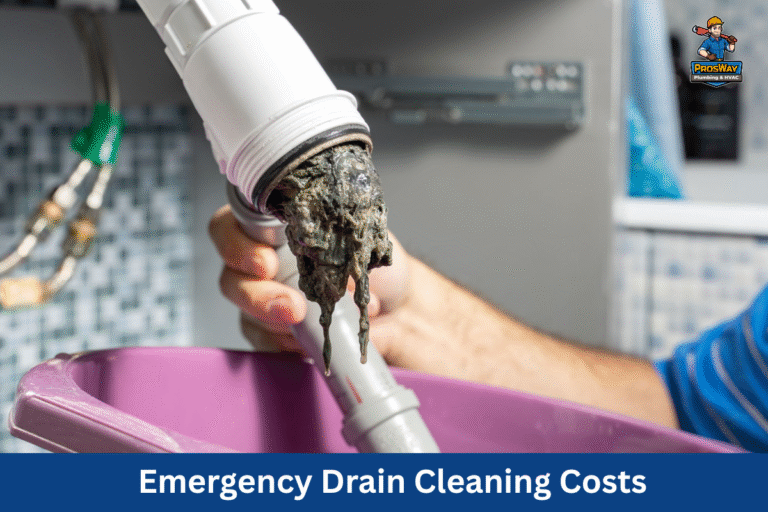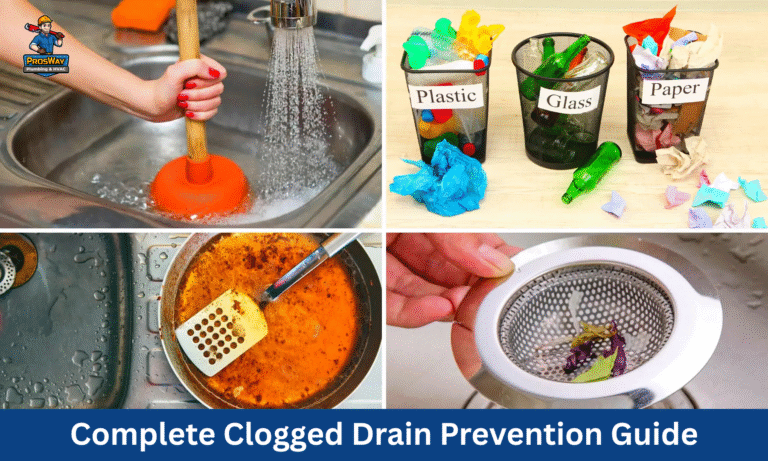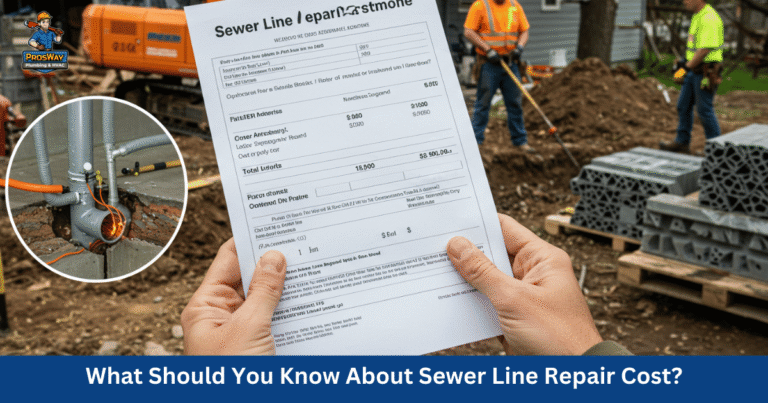Noticing unpleasant smells coming from your drains? A clogged drain smell can make your home feel less fresh and may signal a deeper plumbing issue. These smells often stem from waste buildup, sulfide accumulation, or even pipe corrosion, and catching the problem early can help prevent costly repairs.
This guide, we’ll walk you through how to identify clogged drain smells, DIY solutions to tackle them, and when to call in the professionals. At ProsWay Plumbing & HVAC, we’ve helped countless homeowners remove drain smells and keep their plumbing in top condition. Let’s keep your home smelling fresh and your drains flowing smoothly!
Key Takeaways
- Regular drain maintenance helps prevent foul odors caused by buildup and bacteria.
- Common odor sources include food debris, grease, stagnant water, and sewer gas leaks.
- DIY solutions like baking soda, vinegar, and hot water can help neutralize drain smells.
- Slow drainage, gurgling sounds, and persistent odors signal potential plumbing issues.
- Installing drain covers and avoiding grease disposal can reduce the risk of future clogs.
- Professional drain cleaning is recommended for persistent smells or multiple affected drains.
What Are the Causes of Unpleasant Smells From Drains?
Foul odors from drains can arise from various sources, including clogs, bacteria, and decay. Therefore, knowing these factors is essential for homeowners.
Identifying Common Sources of Foul Smells
Smelly drains often result from a combination of organic buildup and standing water. Food particles, hair, and soap waste can create clogs, leading to drain smells that become increasingly noticeable over time.
In severe cases, these issues may increase into sewer odors, which can signal deeper plumbing problems.
For instance, a failed pump or venting issue related to the roof necessitates immediate attention from a professional to resolve the underlying causes.
The Role of Bacteria and Decay
Bacteria play a significant role in the development of unpleasant smells from drains due to the decomposition of organic matter.
As food scraps, hair, and soap residue degrade, they can create a sewer smell that indicates a potential backup in the plumbing system.
So, regular drain cleaning is required to prevent bacteria buildup; using a plunger can be a helpful first step, particularly in addressing minor clogs before they worsen into more serious issues.
| Cause | Explanation | Solution |
|---|---|---|
| Bacteria Buildup | Decomposing organic material in drains leads to unpleasant odors. | Regular drain cleaning and using a plunger for minor clogs can help. |
| Stagnant Water | Water that remains in the pipes allows for decay and bad smells. | Clear blockages promptly to ensure proper drainage. |
| Septic Issues | A sewer smell can signal deeper plumbing problems or backups. | Seek professional assistance to assess and repair the system. |
Plumbing Issues That Contribute to Smells
Plumbing issues that cause unpleasant odors often originate from blockages or breaks in the system. For instance, if oil or grease builds up in kitchen pipes, it can cause a sewage smell that disturbs the home environment.
Homeowners should remain careful for signs of gas leaks or other hazardous conditions, urging them to contact a professional plumber for a thorough evaluation and effective remedy.
Prosway offers Gas Line Replacement & Installation to ensure safety and efficiency in your home. Also, using citrus cleaners can help diminish foul smells and maintain a clean drain system.
Environmental Factors Affecting Drain Smells
Environmental factors can significantly influence drain smells, particularly those arising from a septic tank or sewer system.
A mixture of standing water and decaying organic material creates an environment favorable for bacterial growth, often leading to unpleasant smells.
If chemicals introduced into the drains react with this bacterial buildup, it can increase the odors, making it essential for homeowners to monitor what is introduced into their plumbing systems.
| Environmental Factor | Impact on Drain Smells | Recommended Action |
|---|---|---|
| Septic Tank Issues | Improper functioning can cause foul odors to escape. | Regular maintenance and inspections of the septic system. |
| Water Stagnation | Allows decay and promotes bacterial growth. | Ensure proper drainage by clearing blockages. |
| Chemical Reactions | Can trigger unpleasant odors from waste decomposition. | Avoid pouring harsh chemicals down the drain. |
Investigating Kitchen vs. Bathroom Drain Odors
Kitchen and bathroom drains can discharge different types of smells due to the specific waste they handle.
Kitchen drains often struggle with food particles and grease, creating a buildup that can cause a sewer smell if not managed properly.
On the other hand, bathroom drains may develop unpleasant odors from hair and soap waste; using baking soda and vinegar can be an effective solution for this issue.
This helps to neutralize smells and maintain clean pipes. If unpleasant smells persist, considering a drain cleaning service may be necessary to ensure thorough maintenance and prevent further plumbing problems.
Signs Indicating Drain Problems and Odor Issues

Noticing unusual strong smells, such as a persistent sink drain smell, is often the first indication of a clogged drain. Homeowners should also observe slow water drainage and any potential backups. Here’s the detail:
Noticing Unusual Strong Smells in the Home
Homeowners should remain alert to unusual strong smells, as these can signal issues with their plumbing systems.
The presence of smells related to soap or organic matter often presents a potential clog, while a foul scent resembling sewer gases might suggest problems beyond basic blockages, such as a compromised sewer line.
Taking action, like using lemon for its natural deodorizing properties, can help temporarily reduce these smells.
However, persistent odors typically require professional interference to address the underlying issue effectively:
- Strong smells from drains may suggest soap buildup or organic matter.
- Foul odors resembling sewer gases often indicate sewer line issues.
- Natural remedies, like lemon, can provide temporary relief from unpleasant smells.
Observing Slow Water Drainage and Backups
Slow water drainage and frequent backups serve as clear indicators of potential drain issues or clogs. These problems often result from a buildup of materials like soap scum and organic matter, leading to stagnant water that fosters mold growth and unpleasant drain smells.
Homeowners should be watchful for signs of leaks, as these can further contribute to foul odors and create a favorable environment for bacteria, including hydrogen sulfide, which discharges a sharp foul odor.
Addressing these issues quickly can help maintain a clean and functional plumbing system. Sewer Line Repair Services can resolve deep-rooted drainage problems before they worsen.
Detecting Gurgling Sounds From Drainage Systems
Gurgling sounds from a drain system can indicate an issue with the pipes, often revealing a potential clog. When water struggles to flow through a sink, air may become trapped, creating these noticeable sounds.
If homeowners hear such gurgling, it may also be associated with an unpleasant smell, signaling the need for immediate attention to prevent further drainage problems and restore normal functionality.
The Connection Between Moisture and Odors
The connection between moisture and smells from drains can be significant, as stagnant water often leads to the growth of harmful bacteria, creating unpleasant smells similar to sewage.
Proper ventilation in the plumbing system is crucial; without it, air may be trapped, resulting in heightened odors.
Besides, homeowners can benefit from using a reliable drain cleaner on occasion to clear any build-up, particularly in areas like the garbage disposal unit, to prevent further drainage issues and maintain a fresher environment.
Recognizing Changes in Drain Appearance
Changes in drain appearance can be a sign of existing issues. Homeowners should look for visible waste gathering around drains, which can indicate a buildup of bacteria and possible clogs.
In bathrooms and kitchens, particularly near the dishwasher, dark spots or discoloration around drain openings may reveal ongoing moisture buildup under pressure.
Also, this suggests more serious plumbing problems that need addressing before they lead to unpleasant odors or damage.
Effective Methods for Identifying Drain Odors

Identifying drain odors effectively requires a systematic approach. Homeowners can utilize their sense of smell to pinpoint the odor’s source, alongside conducting visual inspections around drain areas for signs of buildup. Below is the detail:
Utilizing Your Sense of Smell to Locate Source
Using one’s sense of smell is a practical and effective method for identifying clogged drain odors. Homeowners can carefully assess the intensity and type of smell to help pinpoint the source of the problem.
For example, a sewer-like smell typically indicates a deeper plumbing issue, while a milder smell may suggest organic buildup in a specific area of the drainage system:
- Assess the strength and nature of the odor to narrow down possible sources.
- Identify specific drain locations that emit the strongest smells.
- Distinguish between different types of odors to determine the necessary action.
Conducting Visual Inspections of Drain Areas
Conducting visual inspections around drain areas is an effective technique for identifying clogged drain smells.
Homeowners should look for signs of buildup, such as dark spots, debris buildup, or discoloration around drains, especially in high-use areas like kitchens and bathrooms.
Regular inspections can help detect potential issues early, allowing for timely intervention before odors worsen or lead to more significant plumbing concerns:
- Inspect for visible debris around drain openings.
- Check for dark spots or moisture accumulation near drains.
- Observe any noticeable changes in drain appearance.
Using Tools and Devices for Odor Detection
Using specialized tools and devices can significantly enhance the process of detecting unpleasant drain odors.
For instance, a drain inspection camera allows homeowners to visualize the interior of pipes, identifying blockages and buildup that may lead to foul smells.
Additionally, odor detection devices can help pinpoint specific areas in the plumbing system where unpleasant smells originate, enabling more efficient and targeted solutions for maintaining a clean and functional drainage system.
Employing Smoke Testing for Uncovering Hidden Drains
Employing smoke testing is a highly effective method for uncovering hidden drains and identifying the source of unwanted smells.
This technique involves introducing harmless smoke into the plumbing system, which can reveal leaks or blockages not visible through standard inspections.
Homeowners who suspect clogged drain smells can benefit from this approach, as it provides clear indications of problem areas that may require professional attention, ensuring timely and efficient resolutions to restore a pleasant environment in their homes.
Enlisting Professional Services for Comprehensive Checks
Employing professional services for comprehensive checks can be an effective solution for identifying clogged drain smells.
Professionals use advanced tools, such as cameras and odor detection devices, to pinpoint the exact source of unpleasant smells within the plumbing system.
By addressing the issue early, homeowners can prevent further damage and ensure their drainage systems function properly, ultimately leading to a cleaner and healthier home environment:
| Method | Description | Benefits |
|---|---|---|
| Drain Inspection Cameras | Used to visualize the inside of pipes and identify blockages. | Provides clear images, helping diagnose issues accurately. |
| Odor Detection Devices | Works to locate specific areas emitting foul smells. | Allows for targeted solutions, improving efficiency in repairs. |
| Professional Evaluations | Comprehensive assessments of the plumbing system. | Identifies potential problems before they escalate, saving costs. |
DIY Solutions for Unpleasant Drain Odors
Addressing unpleasant drain smells can be achieved through several effective DIY solutions. Below is the detail:
Creating Baking Soda and Vinegar Remedies
Creating a baking soda and vinegar remedy is an effective DIY solution for addressing unpleasant drain odors caused by clogs.
Watch this quick video tutorial on how to use baking soda and vinegar to clean your drains effectively: How to Get Rid of Drain Smell?
Homeowners can simply combine a half cup of baking soda with a half cup of vinegar and pour the mixture down the drain, allowing it to bubble for several minutes.
This reaction helps to break down organic buildup and neutralize odors, effectively restoring a fresher scent to the plumbing system without the use of harsh chemicals.
Implementing Regular Cleaning Routines
Implementing regular cleaning routines for drains is vital to prevent unpleasant odors associated with clogged drains.
Homeowners can incorporate simple practices, such as pouring hot water down the drains weekly to help dissolve grease and debris, which can otherwise contribute to foul smells.
Additionally, using baking soda followed by vinegar on a monthly basis can effectively break down organic matter and remove any lingering smells, ensuring that the plumbing system remains clean and functional.
Using Natural Ingredients to Mask Odors
Using natural ingredients can effectively cover unpleasant drain smells and improve overall hygiene within the plumbing system.
Homeowners can use products such as baking soda, lemon juice, and essential oils, which neutralize bad smells and promote a fresh scent.
For instance, adding a few drops of essential oil like tea tree or eucalyptus after cleaning can provide a pleasant fragrance while fighting bacteria and organic buildup, keeping drains smelling clean and inviting.
Performing System Flushes With Hot Water
Performing system flushes with hot water can significantly improve the condition of drains and help remove unpleasant odors.
By pouring boiling water down the drains, homeowners can dissolve accumulated grease and organic material, minimizing the buildup that often leads to foul smells.
This simple technique both aids in maintaining clear pipes and contributes to a fresher environment in the home:
| Action | Purpose | Frequency |
|---|---|---|
| Pouring boiling water | Dissolves grease and organic material | Weekly |
| Follow with baking soda and vinegar | Neutralizes odors and cleans pipes | Monthly |
| Inspect drains regularly | Identify potential clogs early | As needed |
Preventing Future Odors With Maintenance Strategies
To prevent future odors from clogged drains, homeowners should incorporate regular maintenance strategies into their routines.
This includes flushing drains with hot water weekly to help dissolve grease and organic material that can gather over time.
Additionally, periodic use of baking soda and vinegar can further promote cleanliness and freshness, effectively reducing the risk of unpleasant smells emerging in the first place.
When to Seek Professional Help for Drain Odors

Identifying signs that require expert attention is crucial for managing drain odors effectively. Also, regular inspections helps prevent escalating issues. Evaluating the drain unclogging cost versus DIY repairs can determine the best course of action while finding reliable plumbers ensures quality solutions.
Identifying Signs That Require Expert Attention
Homeowners should be observant of specific signs that indicate the need for professional assistance with clogged drain smells.
For instance, persistent odors that do not respond to DIY cleaning methods may signal deeper plumbing issues, such as a severe blockage or a failing sewer line.
The Importance of Regular Inspections
Regular plumbing inspections are crucial for identifying clogged drain smells before they worsen into significant plumbing issues.
Homeowners can benefit from establishing a routine maintenance schedule where they assess their plumbing systems at regular intervals, which helps detect odors and uncover potential blockages early.
Engaging a professional plumber for these inspections can provide thorough evaluations, ensuring that any underlying problems are addressed instantly to maintain a healthy home environment:
| Inspection Type | Purpose | Frequency |
|---|---|---|
| Visual Inspection | Check for visible debris around drains and discoloration. | Monthly |
| Routine Maintenance | Ensure proper drainage and prevent buildup. | Quarterly |
| Professional Assessment | Identify hidden issues in the plumbing system. | Annually |
Evaluating the Cost vs. DIY Repairs
When homeowners face persistent clogged drain smells, analyzing the cost of professional help versus DIY solutions is essential.
While minor issues might be addressed with simple fixes at home, deeper plumbing problems often require skilled intervention to avoid intensifying damage and further expenses.
Engaging a qualified plumber can provide long-term solutions and peace of mind, ensuring that the plumbing system operates smoothly and preventing the outbreak of unpleasant odors.
Finding Reliable Plumbers for Drain Issues
Finding reliable plumbers for drain issues is essential for homeowners dealing with unpleasant odors. It is advisable to seek professionals who hold relevant certifications and have a proven track record in the field.
Checking online reviews or asking for recommendations from neighbors can also assist in identifying competent plumbers who can provide effective solutions for clogged drain smells.
Planning for Long-Term Drainage Solutions
Planning for long-term drainage solutions involves establishing proactive measures to maintain a healthy plumbing system while preventing unpleasant smells from clogged drains.
Homeowners should regularly schedule drain inspections to identify potential issues early, implement routine maintenance practices, and avoid problems associated with grease and debris buildup.
| Action | Purpose | Frequency |
|---|---|---|
| Regular Drain Inspections | Identify potential plumbing issues before they escalate. | Every 6 months |
| Routine Maintenance | Prevent buildup of grease and debris. | Quarterly |
| Professional Service Evaluation | Ensure comprehensive checks of the plumbing system. | Annually |
Preventive Measures to Avoid Unpleasant Drain Smells

Maintaining cleanliness in kitchen and bathroom drains is critical to preventing unpleasant smells. Implementing regular maintenance schedules, avoiding harmful chemicals, and educating household members on proper waste disposal can significantly improve drainage conditions.
Maintaining Cleanliness in Kitchen and Bathroom Drains
Keeping cleanliness in kitchen and bathroom drains is crucial for preventing unpleasant odors that indicate clogged drain smells.
Regularly removing food debris, hair, and soap residue helps keep drains clear and reduces the risk of bacteria buildup, which can cause foul smells.
Implementing simple practices, such as pouring hot water down the drains and using natural cleaners like baking soda, can greatly improve cleanliness, ensuring a fresher environment:
- Remove food particles and hair regularly to prevent clogged drains.
- Use hot water to dissolve grease and maintain clear pipes.
- Incorporate natural cleaners, like baking soda, for ongoing maintenance.
Avoiding Use of Harmful Chemicals
Avoiding the use of harmful chemicals is important for maintaining a healthy plumbing system and preventing unpleasant drain smells.
Many commercial drain cleaners contain harsh substances that can damage pipes over time and lead to further plumbing issues.
Instead, homeowners can opt for natural solutions, such as baking soda and vinegar, which effectively eliminate buildup without introducing toxic chemicals that harm the environment and plumbing systems.
- Regularly remove food particles and hair to prevent clogs.
- Use hot water to dissolve grease and maintain clear pipes.
- Incorporate natural cleaners like baking soda for ongoing maintenance.
Educating Household Members on Proper Waste Disposal
Educating household members on proper waste disposal is vital for preventing unpleasant drain smells. Simple practices, such as not flushing items like grease, hair, or food particles down the sink, can significantly reduce the risk of clogs.
Providing clear guidelines for disposing of waste can help create a cleaner and healthier plumbing system, ultimately minimizing the chances of foul smells developing:
| Waste Type | Recommended Action | Impact on Drains |
|---|---|---|
| Grease | Dispose of it in the trash, not down the sink. | Prevents clogs and unpleasant smells. |
| Hair | Use a drain cover to catch hair before it goes down. | Reduces buildup that leads to odors. |
| Food Particles | Compost or dispose of properly instead of using the garbage disposal. | Minimizes organic matter contributing to foul smells. |
Installing Preventive Devices to Reduce Odors
Installing preventive devices, such as drain covers and traps, can significantly reduce odors originating from clogged drains.
These devices can catch debris before it enters the plumbing system, minimizing the chance of buildups that lead to unpleasant smells.
Also, homeowners should consider using devices that utilize activated charcoal or baking soda to neutralize odors, creating a fresher environment in the home:
| Device Type | Function | Benefits |
|---|---|---|
| Drain Covers | Traps food particles and hair before they enter the drain. | Reduces clogs and prevents foul odors. |
| Activated Charcoal Filters | Absorbs odors and keeps drains smelling fresh. | Offers a natural solution for odor control. |
| Baking Soda Devices | Neutralizes unpleasant smells in drains. | Provides an eco-friendly option for homeowners. |
Conclusion
Proper identification of drain odors plays a critical role in protecting both the home environment and avoid major plumbing problems. Homeowners need to detect noticeable smells together with slow draining water and gurgling sounds to find and solve potential plumbing issues as early as possible. By maintaining consistent drainage maintenance and implementing simple home-based solutions people can successfully remove offensive smells.
Take Action Against Drain Odors Today!
Unpleasant drain smells can be more than just a nuisance—they can signal deeper plumbing issues. Don’t let bad odors disrupt your home’s comfort! At ProsWay Plumbing & HVAC, we specialize in expert drain cleaning and removal of odors for homes in Parsippany. Call us now at (862) 260-5870 right now or Book Online for residential clients in Parsippany and neighboring areas of North Jersey.









